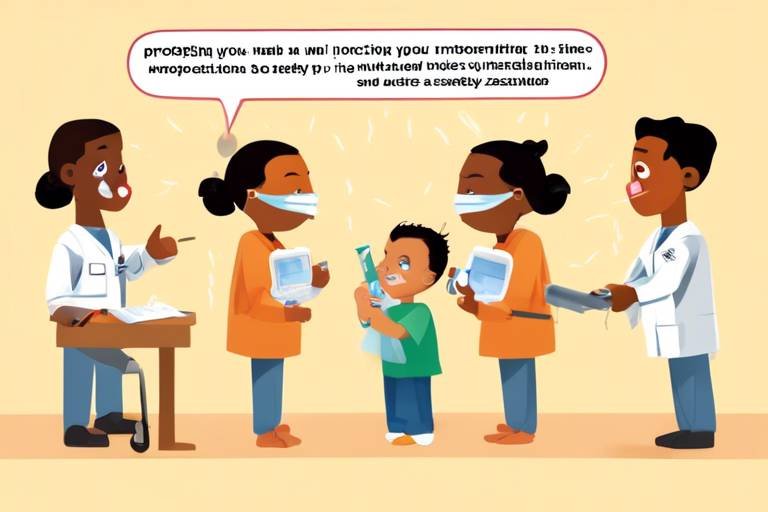Discussing the Safety of Mental Health Apps
Mental health apps have become a significant part of our digital landscape, offering users a convenient way to manage their mental well-being. However, as these applications proliferate, so do the safety concerns surrounding them. Are they truly effective? Can users trust these platforms with their sensitive information? In this article, we will dive deep into these pressing questions, evaluating the effectiveness of mental health apps, the privacy issues they raise, and the critical need for regulation to ensure the safety and well-being of users in this digital age.
With the rise of technology, mental health apps have emerged as a popular resource, providing support ranging from mindfulness exercises to cognitive behavioral therapy techniques. But while the accessibility of these tools is a boon for many, it also raises a multitude of questions about their safety and reliability. Are we trading our mental health for convenience? This article aims to unravel these complexities and shed light on the safety measures that should be in place to protect users.
In a world where our smartphones are practically an extension of ourselves, it's essential to scrutinize the implications of using mental health apps. The benefits can be substantial, yet the risks cannot be overlooked. By addressing these concerns, we hope to foster a more informed user base that can navigate the mental health app landscape with confidence.
Mental health apps are digital tools designed to support mental well-being. They serve various purposes, from providing guided meditations to offering cognitive behavioral therapy techniques. As technology continues to evolve, these apps are increasingly integrated into personal health management, making them accessible to a broader audience. However, the diversity in their design and functionality can lead to confusion regarding their effectiveness and safety.
These applications can be categorized into several types, including:
- Self-Help Apps: Focus on providing users with tools and techniques to manage their mental health independently.
- Therapeutic Apps: Offer guided therapy sessions or exercises based on established psychological methods.
- Community Support Apps: Create a platform for users to connect and share their experiences with others.
As mental health apps gain traction, it’s crucial to understand their role in the larger context of health management. Users must be aware of what these apps can and cannot do, ensuring they use them as a complementary tool rather than a replacement for professional help.
The effectiveness of mental health apps varies widely, and this inconsistency can lead to user frustration. To evaluate these applications, we need to consider several criteria:
- Scientific Backing: Are the techniques and methods used in the app supported by research?
- User Engagement: Does the app keep users engaged and motivated to return?
- Outcome Measurement: Are there measurable improvements in users' mental health?
Studies show that while some apps can significantly improve users' mental health, others may not have any impact at all. This highlights the importance of thorough evaluation before choosing a mental health app.
User experience is a crucial factor in the effectiveness of mental health apps. A well-designed app can enhance user engagement, leading to better mental health outcomes. For instance, if an app is difficult to navigate or visually unappealing, users may abandon it quickly, missing out on potential benefits. Therefore, developers must prioritize user-friendly design and intuitive interfaces to keep users engaged.
Personalization is another key element that can enhance user engagement and effectiveness. Apps that tailor content and features based on user preferences can significantly improve user satisfaction. When users feel that the app is tailored to their unique needs, they are more likely to stick with it and benefit from its offerings.
Gamification can also motivate users to engage with mental health apps. By incorporating game-like features, such as rewards for completing tasks or challenges, these apps can create a more enjoyable and engaging experience. This not only keeps users coming back but also encourages them to adopt healthier mental health practices.
Privacy concerns are paramount when using mental health apps. The sensitive nature of the information shared within these platforms raises significant questions about data protection. Users must understand the implications of sharing their personal information and ensure that the apps they choose prioritize data security. It's crucial for developers to implement robust security measures to protect user data from breaches and misuse.
Regulatory measures are essential for ensuring the safety of mental health apps. Currently, there are varying regulations in place, but the landscape is evolving. Health authorities need to establish clear guidelines that govern the development and use of mental health apps, ensuring they meet safety and efficacy standards.
Compliance with established standards is vital for mental health apps. Existing frameworks should be explored to ensure that app developers prioritize user safety and data integrity. This compliance not only protects users but also enhances the credibility of the apps themselves.
The future of mental health apps is promising yet challenging. As technology evolves, we can expect advancements in user engagement, regulatory measures, and the overall effectiveness of these applications. However, it is crucial to remain vigilant about safety and privacy concerns to ensure that these tools can genuinely benefit users without compromising their well-being.
Q: Are mental health apps effective?
A: The effectiveness of mental health apps varies. Some are backed by research and can provide significant benefits, while others may not be as impactful.
Q: How can I ensure my data is safe while using these apps?
A: Look for apps that prioritize data security and have clear privacy policies outlining how your information is used and stored.
Q: Should I rely solely on mental health apps for support?
A: While mental health apps can be helpful, they should complement, not replace, professional help. Always consult with a mental health professional for serious concerns.

Understanding Mental Health Apps
Mental health apps have surged in popularity over the past few years, becoming a vital part of the digital health landscape. These applications are designed to support and enhance mental well-being by providing users with tools and resources at their fingertips. But what exactly are these apps, and how do they fit into our daily lives? In essence, mental health apps serve a variety of purposes, from offering guided meditation and cognitive behavioral therapy exercises to providing mood tracking and journaling features. They aim to empower users to take charge of their mental health and well-being.
There are several types of mental health apps available today, each catering to different needs and preferences. For instance, some apps focus on therapy and counseling, providing users with access to licensed professionals through messaging or video calls. Others emphasize self-help techniques, offering exercises and activities that users can engage with independently. Additionally, some apps are designed specifically for certain populations, such as those dealing with anxiety, depression, or PTSD. This diversity in app types allows users to find resources that resonate with their unique experiences and challenges.
As we integrate these digital tools into our personal health management routines, it’s essential to recognize their potential benefits and limitations. Mental health apps can serve as a supplementary resource, offering support between therapy sessions or during times when professional help may not be immediately accessible. However, it’s crucial to remember that these apps are not a replacement for professional mental health care. Just like a fitness app can guide you in your workouts but doesn't replace a personal trainer, mental health apps can provide valuable tools but should be used in conjunction with professional guidance when necessary.
In the age of technology, where we can access information and support with just a few taps on our smartphones, mental health apps have become a beacon of hope for many. They are not only convenient but also provide a sense of anonymity and accessibility that traditional therapy may lack. However, as we embrace these digital solutions, we must also remain vigilant about their safety and effectiveness. Understanding the landscape of mental health apps is the first step in ensuring that we utilize them wisely and responsibly.

Evaluating Effectiveness
When it comes to mental health apps, the question on everyone’s mind is, "Do they really work?" The effectiveness of these digital tools can vary significantly, and understanding what makes one app more effective than another is crucial for users seeking help. Evaluating the effectiveness of mental health apps involves several criteria, including clinical validation, user engagement, and overall satisfaction. Numerous studies have attempted to measure the impact these applications have on users' mental health, and the results can be quite enlightening.
Research indicates that while some mental health apps show promise, others may fall short of delivering tangible benefits. A key factor in determining effectiveness is whether the app is backed by scientific research. For instance, apps that incorporate evidence-based practices, such as cognitive behavioral therapy (CBT), tend to yield better results. According to a study published in the journal Psychological Medicine, users of CBT-based apps reported a significant reduction in symptoms of anxiety and depression compared to those who used non-evidence-based apps.
Another important aspect to consider is user engagement. An app might be clinically validated, but if users don’t engage with it, its effectiveness diminishes dramatically. This is where user experience comes into play. Apps that are intuitive, visually appealing, and easy to navigate tend to keep users coming back. For example, a survey found that 70% of users cited ease of use as a major factor in their continued engagement with a mental health app. The more users interact with the app, the more likely they are to experience positive outcomes.
Moreover, personalization features can significantly enhance the effectiveness of mental health apps. When users feel that the content is tailored to their specific needs, they are more likely to engage with the app regularly. For instance, an app that allows users to set personal goals or provides customized reminders can lead to better adherence to mental health practices. This personalized approach not only boosts user satisfaction but also fosters a sense of ownership over one’s mental health journey.
To illustrate these points, let’s take a look at a table summarizing findings from various studies on the effectiveness of mental health apps:
| Study | Type of App | Effectiveness Rating | Engagement Level |
|---|---|---|---|
| Smith et al. (2020) | CBT-based | High | 85% |
| Johnson et al. (2019) | Mood Tracking | Moderate | 60% |
| Lee et al. (2021) | Mindfulness | High | 75% |
| Brown et al. (2022) | General Wellness | Low | 40% |
As we can see from the table, apps that are based on established psychological principles tend to have higher effectiveness ratings and user engagement levels. However, it’s essential to remember that effectiveness is subjective and can vary from person to person. What works for one individual may not work for another, and that’s perfectly okay. The key is to find an app that resonates with your personal needs and preferences.
In conclusion, evaluating the effectiveness of mental health apps is a multifaceted process that involves examining clinical validation, user engagement, and personalization features. As the digital landscape continues to evolve, so too will the tools available for mental health support. Users should remain informed and proactive in choosing apps that not only meet their needs but also have a solid foundation in psychological research.
- Are mental health apps a substitute for therapy? No, while they can be helpful, they should complement therapy, not replace it.
- How do I choose the right mental health app? Look for apps with scientific backing, positive user reviews, and features that meet your specific needs.
- Can mental health apps guarantee results? No app can guarantee results, but many have shown effectiveness in improving mental health when used consistently.

User Experience and Engagement
When it comes to mental health apps, the user experience is not just a nice-to-have; it’s a critical component that can make or break the effectiveness of these digital tools. Imagine walking into a therapist's office where the environment feels welcoming, the layout is intuitive, and the therapist knows exactly how to engage you. Now, think of a mental health app that offers a similar vibe. If users find an app easy to navigate and engaging, they are much more likely to stick with it and reap its benefits. But what makes an app truly user-friendly?
First off, the design plays a pivotal role. A clean, aesthetically pleasing interface can significantly enhance the user experience. Users should feel comfortable and at ease while using the app, much like they would in a cozy café. Moreover, the app's functionality needs to be seamless. If users encounter glitches or confusing navigation, they might abandon the app altogether, which defeats the purpose of using it for mental health support.
Engagement is another key factor. Apps that incorporate features like reminders for daily check-ins, mood tracking, or guided meditations can foster a deeper connection with users. Think of it this way: if a friend consistently checks in on you, you’re more likely to feel supported and motivated. Similarly, mental health apps that encourage regular interaction can help users develop healthier habits. Here are some elements that can enhance user engagement:
- Interactive Features: Quizzes, journaling prompts, and mood trackers can make the experience more engaging.
- Community Support: Some apps offer forums or chat features where users can connect with others, fostering a sense of belonging.
- Feedback Mechanisms: Allowing users to provide feedback can create a sense of ownership and improve the app over time.
Moreover, the concept of personalization cannot be overlooked. Users are more likely to stay engaged with an app that feels tailored to their specific needs. This could mean customizing features based on their preferences or providing content that aligns with their personal journey. Personalization can range from simple adjustments, like changing the app's color scheme, to more complex algorithms that recommend exercises or articles based on user behavior.
In addition, gamification elements can significantly boost user engagement. By incorporating game-like features such as points, badges, or challenges, apps can motivate users to participate more actively. Imagine earning a badge for completing a week of daily meditations or receiving points for engaging in positive affirmations. This not only makes the process enjoyable but also instills a sense of achievement, encouraging users to continue their mental health journey.
Ultimately, the interplay between user experience and engagement is crucial for the success of mental health apps. When users feel that an app is not just a tool but a companion in their journey toward better mental health, they are more likely to engage with it regularly. As developers continue to innovate and refine their offerings, focusing on these aspects will be essential for creating effective mental health solutions that genuinely resonate with users.
Q: How can I determine if a mental health app is right for me?
A: Look for apps that align with your specific needs, such as mood tracking, meditation, or therapy resources. Reading user reviews and trying out multiple apps can also help you find the best fit.
Q: Are mental health apps safe to use?
A: While many apps are designed with user safety in mind, it’s crucial to check their privacy policies and data security measures. Opt for apps that comply with relevant regulations and have positive user feedback.
Q: Can mental health apps replace traditional therapy?
A: Mental health apps can complement traditional therapy but are not a substitute for professional help. They can provide valuable tools and resources, but for severe issues, consulting a licensed therapist is recommended.

Personalization Features
In the ever-evolving landscape of mental health apps, stand out as a beacon of hope for users seeking tailored mental health support. Imagine walking into a café where the barista knows exactly how you like your coffee—this is the essence of personalization in mental health applications. By customizing content and experiences to fit individual needs, these apps can significantly enhance user engagement and satisfaction.
Personalization can take many forms, from customized content recommendations to adaptive user interfaces that respond to user behavior. For instance, some apps utilize algorithms that analyze user interactions, tailoring the therapeutic exercises or articles presented based on what has resonated most with the user. This not only makes the experience more relevant but also fosters a sense of connection and understanding, which is crucial for mental well-being.
Furthermore, personalization can manifest through features such as:
- Goal Setting: Users can set personal mental health goals that align with their unique challenges and aspirations, receiving tailored feedback and resources.
- Progress Tracking: Many apps allow users to track their mental health journey, providing insights and adjustments to their personalized plan based on their progress.
- Content Customization: Users may select their interests or preferred coping strategies, ensuring that the materials presented are not only useful but also engaging.
Research has shown that users who engage with personalized features are more likely to stick with the app over time. This is because personalization meets users where they are, addressing their specific needs and preferences, making mental health management feel less daunting and more approachable. Just like a well-fitted pair of shoes, a personalized mental health app can provide comfort and support, encouraging users to take steps toward better mental health.
In conclusion, the integration of personalization features in mental health apps is not merely a trend; it is a fundamental shift in how we approach mental health care in the digital age. As technology continues to advance, we can expect these features to become even more sophisticated, further enhancing the user experience and overall effectiveness of mental health support.

Gamification Elements
Gamification is a powerful tool that can transform the way we interact with mental health apps. Imagine turning the often daunting journey of mental wellness into an engaging adventure, where users feel motivated to participate actively in their own healing process. By incorporating game-like features, these apps can create an environment that encourages users to set goals, track their progress, and celebrate their achievements. This approach not only makes the experience more enjoyable but also fosters a sense of community among users.
So, what exactly are these gamification elements? They can include a variety of features such as:
- Points and Rewards: Users earn points for completing tasks or engaging with the app, which can lead to rewards like badges or unlockable content.
- Challenges and Quests: Setting specific challenges or quests can help users focus on particular mental health goals, making progress feel like an exciting journey.
- Leaderboards: Friendly competition can motivate users to stay engaged by comparing their progress with others, fostering a sense of accountability.
Research has shown that these gamification elements can significantly enhance user engagement and adherence to mental health practices. For instance, a study published in the Journal of Medical Internet Research found that users of gamified mental health apps reported higher levels of satisfaction and were more likely to continue using the app over time. This is a crucial factor, as consistent engagement is often key to achieving meaningful outcomes in mental health management.
Furthermore, gamification can also help reduce the stigma associated with mental health treatment. By presenting mental wellness in a fun and interactive way, users may feel more comfortable seeking help and discussing their challenges. It’s like turning a serious subject into a game—making it less intimidating and more approachable.
However, it’s important to strike the right balance. Overly competitive environments can lead to stress and anxiety, which defeats the purpose of using these apps for mental health support. Developers must carefully consider how to implement gamification in a way that encourages positive engagement without overwhelming users. This is where user feedback becomes invaluable, as it helps creators refine their designs to better meet the needs of their audience.
In conclusion, gamification elements in mental health apps have the potential to revolutionize user engagement and effectiveness. By transforming the mental health journey into an interactive experience, these features can motivate users to take charge of their mental well-being in a fun and supportive way.
Q1: What is gamification in mental health apps?
A1: Gamification involves incorporating game-like features into mental health apps to enhance user engagement and motivation. This can include points, rewards, challenges, and leaderboards.
Q2: How does gamification improve mental health outcomes?
A2: By making the process of engaging with mental health tools more enjoyable and interactive, users are more likely to stick with the app, leading to better adherence to mental health practices and improved outcomes.
Q3: Are there any risks associated with gamification in mental health apps?
A3: Yes, if not implemented carefully, gamification can lead to increased stress or anxiety among users. It's essential for app developers to find a balance that promotes positive engagement without overwhelming users.
Q4: Can gamification help reduce the stigma around mental health?
A4: Absolutely! By presenting mental health support in a fun and engaging manner, gamification can make users feel more comfortable discussing their mental health challenges and seeking help.

Privacy and Data Security
In today's digital landscape, the privacy and data security of mental health apps are more critical than ever. With the increasing reliance on these applications for managing mental well-being, users often share sensitive information that could have serious implications if mishandled. Imagine discussing your deepest fears or personal struggles, only to find out that this information is not adequately protected. This scenario highlights the urgent need for robust security measures and transparent privacy policies.
Many mental health apps collect a range of personal data, including names, email addresses, and even health-related information. Users might not realize that this data can be vulnerable to breaches, leading to unauthorized access and potential misuse. Therefore, it’s essential for developers to implement strong encryption protocols and secure data storage practices. For instance, a study by the Journal of Medical Internet Research found that only about 30% of popular mental health apps comply with basic privacy standards. This statistic serves as a stark reminder that not all apps are created equal when it comes to safeguarding user data.
Furthermore, users should be aware of the types of data being collected. Here’s a breakdown of common data types that mental health apps might collect:
- Personal Identifiable Information (PII): Names, email addresses, phone numbers.
- Health Data: Mood logs, therapy session notes, medication schedules.
- Usage Data: How often the app is used, features accessed, and duration of use.
When considering a mental health app, users should ask critical questions about how their data will be used. Will it be shared with third parties? Are there clear guidelines on data retention? Understanding these aspects can empower users to make informed choices about their mental health management. Additionally, it is crucial for apps to provide users with the ability to delete their data if they choose to discontinue using the service. This feature not only enhances user trust but also aligns with best practices in data privacy.
To further illustrate the importance of privacy and data security in mental health apps, let’s take a look at a comparison of two popular applications:
| App Name | Data Encryption | User Data Control | Third-Party Sharing |
|---|---|---|---|
| App A | End-to-End Encryption | Full Control | No Sharing |
| App B | Basic Encryption | Limited Control | Shares with Partners |
As shown in the table, App A prioritizes user privacy through robust encryption and strict data control policies, while App B raises concerns with its basic security measures and data sharing practices. This comparison underscores the necessity of thoroughly researching any mental health app before use.
In conclusion, while mental health apps can provide invaluable support, users must remain vigilant about their privacy and data security. By choosing apps that prioritize user protection and being aware of how personal information is managed, individuals can enjoy the benefits of these digital tools without compromising their safety.
- Are mental health apps safe to use? Yes, but it’s essential to choose apps that have strong privacy policies and data protection measures in place.
- How can I protect my data while using a mental health app? Look for apps that offer end-to-end encryption and give you control over your data.
- What should I do if I find out my data has been compromised? Immediately contact the app's support team and consider discontinuing use of the app.

Regulatory Oversight
In today's digital age, the proliferation of mental health apps has sparked a vital conversation about . With millions of users turning to these applications for support, it is crucial to ensure that they are safe and effective. Regulatory measures are not just a formality; they are essential for protecting users from potential harm and ensuring that the information provided is accurate and reliable. As we delve into this topic, we will explore the current landscape of regulations governing mental health apps, the role of health authorities, and the pressing need for stricter guidelines.
Currently, the regulation of mental health apps varies significantly across different regions. In some countries, there are comprehensive frameworks in place, while others lack clear guidelines. For instance, the Food and Drug Administration (FDA) in the United States has taken steps to regulate certain mental health apps that function as medical devices. This means that apps claiming to diagnose or treat mental health conditions may require pre-market approval. However, many apps fall into a gray area where they do not meet the criteria for medical devices, leaving users vulnerable to unverified claims.
Moreover, the role of health authorities extends beyond just regulation; they are also responsible for educating users about the potential risks associated with these apps. Users often assume that all mental health apps are safe because they are available on popular app stores. However, without proper oversight, some apps may lack evidence-based practices or may even compromise user privacy. This is where transparency becomes crucial. Users should be made aware of the app's data handling practices, and developers should be encouraged to disclose their methodologies and the qualifications of their contributors.
To illustrate the current state of regulatory oversight, consider the following table that summarizes the regulatory approaches in various regions:
| Region | Regulatory Body | Current Status |
|---|---|---|
| United States | FDA | Regulates apps as medical devices |
| European Union | CE Marking | Varies; some apps require CE marking |
| Australia | Therapeutic Goods Administration (TGA) | Regulates apps based on their function |
| Canada | Health Canada | Guidelines exist but enforcement is limited |
As we look forward, the need for stricter guidelines becomes increasingly apparent. The rapid growth of mental health apps has outpaced the development of regulatory frameworks, leading to potential risks for users. Stricter regulations could ensure that all mental health apps adhere to certain standards, thereby enhancing their credibility and effectiveness. This could also include regular audits of app content and user feedback mechanisms to continuously improve the quality of services offered.
Ultimately, the goal of regulatory oversight is to foster a safe environment where users can confidently seek mental health support through technology. As we continue to navigate this evolving landscape, collaboration between app developers, health authorities, and users will be key to achieving this objective. By prioritizing safety and transparency, we can create a robust framework that not only protects users but also enhances the positive impact of mental health apps on society.
- What are mental health apps? Mental health apps are digital tools designed to help users manage their mental well-being through various features such as self-assessment, mood tracking, and guided therapy.
- How are mental health apps regulated? Regulation varies by region; some apps are considered medical devices and are regulated by bodies like the FDA, while others may not have specific regulations.
- What should I look for in a mental health app? Look for apps that provide evidence-based practices, have transparent data handling policies, and are backed by qualified professionals.
- Are all mental health apps safe to use? Not all apps are created equal. It's important to research and choose apps that comply with regulations and have positive user reviews.

Compliance with Standards
When it comes to mental health apps, compliance with established standards is not just a regulatory checkbox; it's a crucial pillar that ensures user safety and data integrity. As these apps become increasingly integrated into our daily lives, the need for stringent compliance becomes more apparent. Users often turn to these digital solutions in times of vulnerability, making it imperative that the apps they rely on adhere to specific guidelines and best practices.
Several organizations and regulatory bodies have developed frameworks to govern the development and deployment of mental health applications. For instance, the American Psychological Association and the National Institute of Mental Health provide guidelines that help developers create apps that are not only effective but also safe for users. Compliance with these standards can involve various aspects, including:
- Data Protection: Ensuring that user data is encrypted and securely stored.
- Evidence-Based Practices: Utilizing scientifically validated methods for therapy and support.
- User Consent: Obtaining informed consent from users regarding data usage and privacy policies.
Moreover, compliance isn't just about following rules; it's about building trust with users. When users know that an app adheres to recognized standards, they are more likely to engage with it. This trust is essential, especially in mental health contexts, where users may share sensitive information. A study conducted by the Journal of Medical Internet Research found that apps with clear privacy policies and compliance with data protection standards saw a significant increase in user adoption and engagement.
Another critical aspect of compliance is the continuous assessment and improvement of app functionalities. Developers should not only aim for initial compliance but also regularly update their apps to reflect the latest research and feedback from users. This iterative process helps ensure that the app remains relevant and effective in addressing mental health needs.
In summary, compliance with standards is a multifaceted endeavor that encompasses data protection, evidence-based practices, and ongoing user engagement. As the landscape of mental health technology evolves, so too must the frameworks that govern them. This commitment to compliance not only safeguards users but also enhances the overall effectiveness of mental health apps, making them valuable tools in the journey toward better mental health.
- What are the main standards for mental health apps?
The main standards include data protection regulations, evidence-based practices, and user consent protocols. - How can I ensure that a mental health app is safe to use?
Look for apps that are compliant with recognized standards and have transparent privacy policies. - Are there any regulatory bodies overseeing mental health apps?
Yes, organizations such as the American Psychological Association and the National Institute of Mental Health provide guidelines for app development.

Future Directions
The future of mental health apps is not just bright; it's bursting with potential. As technology continues to evolve at a breakneck speed, these digital tools are set to become even more integral to our mental health management. Imagine a world where your mental health app doesn't just track your mood but also learns from your daily habits, offering personalized insights that feel like they were crafted just for you. This level of personalization could revolutionize how we approach mental wellness, making it more accessible and effective for everyone.
One of the most exciting advancements on the horizon is the integration of artificial intelligence (AI) and machine learning. These technologies can analyze vast amounts of data to provide tailored recommendations, predict mental health crises, and even suggest coping strategies based on real-time inputs. For instance, if an app notices a user’s mood dipping consistently on certain days, it could send a gentle reminder to practice self-care or check in with a therapist. This proactive approach could significantly enhance user engagement and outcomes.
Moreover, the rise of virtual reality (VR) and augmented reality (AR) is poised to offer immersive experiences that can help users confront their fears and anxieties in a controlled environment. Picture this: someone with social anxiety could practice social interactions in a virtual setting, gradually building confidence before stepping into the real world. Such innovative methods could provide a new dimension to traditional therapeutic practices, making them more interactive and engaging.
However, with great power comes great responsibility. As we look to the future, the need for stringent regulatory frameworks becomes even more critical. Users must be assured that their data is secure and that the apps they use are safe and effective. Regulatory bodies will need to keep pace with technological advancements, ensuring that mental health apps meet high standards of quality and safety. For instance, a comprehensive regulatory approach could include:
- Regular audits of mental health apps to ensure compliance with safety standards.
- Mandatory transparency about data usage and privacy policies.
- Establishing clear guidelines for app developers to follow during the design and implementation phases.
As we move forward, collaboration between tech developers, mental health professionals, and regulatory authorities will be essential. By working together, we can create a landscape where mental health apps not only thrive but also genuinely contribute to the well-being of users. The potential for growth is enormous, but it must be matched with a commitment to ethical practices and user safety.
In conclusion, the future of mental health apps is an exciting frontier filled with opportunities for innovation and improvement. As we embrace these changes, it's crucial to keep the conversation going about safety, effectiveness, and user experience. After all, at the heart of every app is a person seeking help and support, and we owe it to them to ensure that the tools they use are both effective and secure.
- What are mental health apps? Mental health apps are digital tools designed to support users in managing their mental well-being through various features such as mood tracking, guided meditation, and therapy resources.
- Are mental health apps effective? The effectiveness of mental health apps can vary widely. It's essential to evaluate them based on user experience, engagement, and scientific studies that measure their impact on mental health.
- How do privacy concerns affect the use of mental health apps? Privacy concerns are critical when using mental health apps, as users often share sensitive information. It's vital for these apps to have strong data protection measures in place.
- What role do regulations play in mental health apps? Regulations help ensure the safety and effectiveness of mental health apps by setting standards for compliance, data protection, and user safety.
Frequently Asked Questions (The title must be written in English.)
- What are mental health apps?
Mental health apps are digital tools designed to support and enhance mental well-being. They can offer a variety of features, such as mood tracking, guided meditations, cognitive behavioral therapy exercises, and community support, making them an increasingly popular choice for personal health management.
- How effective are mental health apps?
The effectiveness of mental health apps varies widely. While some apps have been shown to help users improve their mental health, others may not provide significant benefits. It's important to look for apps that are backed by research and have positive user reviews to ensure their effectiveness.
- Are mental health apps safe to use?
Safety can be a concern with mental health apps, particularly regarding data privacy and security. Users should ensure that any app they use complies with data protection regulations and has strong security measures in place to protect their sensitive information.
- What should I look for in a mental health app?
When choosing a mental health app, consider factors such as user experience, personalization features, privacy policies, and whether the app is backed by scientific research. Look for apps that engage users effectively and provide tailored content that meets individual needs.
- How do privacy concerns affect mental health app usage?
Privacy concerns are paramount when using mental health apps, as users often share sensitive information. It's crucial to understand how your data is stored and used by the app. Always read the privacy policy and look for apps that prioritize user confidentiality.
- Is there regulation for mental health apps?
Yes, there is a growing need for regulatory oversight of mental health apps. Current regulations aim to ensure user safety and data integrity, but there is still a call for stricter guidelines to protect users and ensure the effectiveness of these applications.
- What is the future of mental health apps?
The future of mental health apps looks promising, with advancements in technology and a focus on user engagement. However, challenges remain, particularly in terms of regulation and ensuring that apps provide meaningful support to users.



















